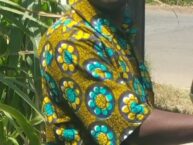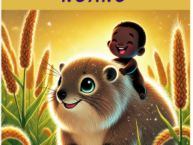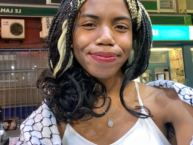
Abdifatah Shafat was born in Kenya, and he is now based in the USA where he is doing a PhD in Anthropology. He is a short story writer, having previously been published in African Writing Online as well as Mizna. This is his first short story to be featured in Munyori Literary Journal.
Hardly three days have passed since Omar arrived in Bura, northern Kenya. From there he trekked for hours to reach the hamlet where he was told his mother lived. However, soon after arriving, he came down with an illness. At first he thought it was the boredom. But later, when the symptoms manifested themselves prominently, he knew they were more than mere boredom. The symptoms are familiar and start as they always have: a mild headache, tingling in the kidneys, loss of appetite, and by the end of the third day, his entire body convulses with an agonizing pain. The never-ending procession of neighbors who have initially trooped over for the used t-shirt from the Goodwill store in America, the orange fruit from Nairobi, to relieve themselves of their Asalam Aleikums, or to listen to the stories from the Strange Land have reduced into a trickle.
For Omar, though, most of the neighbors are new. Those who lived here when he disappeared ten years earlier are not around anymore. Life is so short in this part of Kenya. Like his uncles, aunts, and the numerous other relatives that he can no longer remember, death can either be long and painful or fast and swift. When Omar’s sickness spreads, it immediately transforms into a communal concern.
In the evening of the third day, Batulo, Omar’s mother, hoists him up and helps him outside and gently lays him on a dried cowhide. The hut is too hot. Batulo informs him that the cow died of a snake bite and the only thing they could salvage from it was the hide that he was lying on. Its softness helps numb his burning skin. Omar turns on his back. His head faces upwards and the sun strikes him straight in the face.
Above Omar are the hardened, leafless twigs of a wild tree that like every living thing around it has succumbed to the scorch of the drought. In the sky, vultures are hovering. They swoop low for a snatch, only to fly back with nothing in their beaks. Even for a bird, this land has nothing to offer. Batulo raises to Omar’s mouth an old, blue plastic cup which contains orange-colored, unfiltered water drawn from a stagnant well not too far from their settlement. Omar takes a half-mouth sip and gurgles before swallowing. The coarse sediments of the sand grits in his teeth while the bitter taste of cow-urine accosts his tongue. How little things have changed!
***
Ten years earlier. On a Friday morning, Omar filled a yellow five-liter jerry-can with water and sneaked out to the direction of the main road. On the main road, he sat under an old tree. A few hours later, a truck loaded with cattle rumbled to a near-stop in order to negotiate through a gaping pothole. Omar hailed for the driver who without talking jutted his thumb at the railings. Omar climbed. As the cattle struggled to maintain balance, Omar ducked from the heavy tree branches that flung their enormous arms at him. The truck deposited him in Garissa where he knew no one. Next morning, he headed for a new refugee camp that had opened for those fleeing the madness in Somalia. In the camp, he found work on a construction site and rented a tin-shack for two hundred shillings. A year later, a Somali family invited him to immigrate with them to America.
***
Omar slumps back on the cowhide. The women begin to arrive again. The men are all gone. The shadow of the tree is shrinking from the swelling crowd. They squeeze against each other, some squatting. Older hands gently touch his skin, while younger ones hastily graze their palms against his face. All are testing for the authenticity and the degree of his sickness. Everyone is a doctor. And as their ages vary, so do their diagnoses.
“He’s on fire!” declares an older one, ominously throwing her hand over her scalp.
“I think he is faking it. He’s not even that hot,” counters the budding one.
Batulo sits next to him, seemingly oblivious to the diagnoses being made around her. She has just set aside the old, tattered washcloth that she dipped in the wooden bowl containing lukewarm water and applied it to his face. Her hands are dripping with the water. Now they circle around her tumultuous head, forming scaffolding to prop it up. She has been through this with him many times before. As a child he was always the sick one: malaria, stomach complications, migraine, cough, ear problems, and skin rashes. Though they haven’t killed him like his two younger brothers, Jelle and Kalil, his sicknesses have been a source of constant worry. His father was always absent, leaving the worries to his mother. And without hospitals, she resorted to what she had available: tenacity born of scarcity. She bathed him with warm or cold water as the situation demanded, rubbed him with coconut oil, or applied butter. She called in the sheikhs who dropped their spit on him, reading from the Quran. When these didn’t seem to help, she upped her game. She heated a metal rod until it was red hot and held it to his stomach till his skin went pink, muttering: “I have no other way of helping you. What’s the worst that could happen to you: you will either heal or…” Now, like a zebra, his stomach is dotted with dark spots.
**
Omar dozes off outside encircled by the women. He is stirred by a slither of pain that springs from his neck and runs down to his legs, his toe quivering like a Masai spear. Commotion ensues; the women-crowd recedes and regroups surging forward like a frightened hog, sending a fresh cloud of gray dust into the air. The eldest among the women grips Batulo’s arm and asks, “What is it?”
Batulo lets go of her head momentarily, and glancing sideways charges: “What is what?”
Omar is surprised that she is speaking so rudely to a woman of that age. The toughness of this land has the uncanny way to make people heartless. Or perhaps her worries of him have taken a toll on her. Omar is her only remaining child, her only relative.
“His sickness.” The woman points at Omar as if he were a dead calf.
“How do I know?” Batulo snaps back.
And as if angry at the older woman, she hums that it might be Omar’s demons that are back. Before the old woman opens her mouth again for she is bent on pursuing her case, a middle-aged one standing at the foot of the tree says, “It’s the evil eye!” The evil eye has been a part of Omar’s growing up and many he knew had been said to have died of it. However, Omar’s long residence in the United States has gradually loosened and then completely diminished his former belief in the evil eye. In America, the evil eye hasn’t afflicted him, neither has he seen anyone it has. He wonders if it is place-specific or whether only his people have powers in their eyes.
“Yes,” the woman screams, almost celebrating, “it’s the evil eye.”
The older one extends her arm and runs it over his forehead, grazing her uneven, crooked fingers from his hairline down to his chin. She says that his skin which has been smooth and spotless when he came is now being eaten away by someone else’s eye. Batulo is silenced: the woman has deployed forces which she cannot oppose.
***
Later that night. The women have left for their huts, and Batulo helps Omar into theirs. When the change of location doesn’t stir him to wakefulness, she shakes him with her left hand. He opens his eyes. In her right hand, Batulo is holding a steaming blue cup with a strange-smelling concoction. He sits up.
“Here,” she says, pushing her hand forward.
“What is it?” he asks.
Omar steadies himself to a sitting position, but like a person with a severed backbone, he wobbles. He gets closer to the cup when a strong smell assaults his nostrils. Shortly before his hand meets hers halfway, he recoils and holds his nose with the thumb and index finger.
“Geed Hindi,” his mother says.
Memories of the bitter-tasting leaves flood back to him. Geed Hindi—the Indian tree—has awful, smelly bitter-tasting leaves. The leaves are mixed with water and boiled; the claim being that the concoction treats diseases and afflictions.
“Why do I need it?” he asks.
“It will treat the evil eye,” she asserts.
“I have no evil eye.”
“Yes, you do.”
“No, I don’t.”
“What have you then?” she says, frustrated.
“Malaria.”
She snorts.
Batulo examines Omar closely, perhaps trying to decipher the strangeness that he has brought back from America. Her eyes are bobbing in their sockets, penetrating the semi-darkness of the hut and poking inquisitively into his skin. The faint, yellow light that is shining from a tin-lamp in the corner is almost giving out; its flames dancing with the slightest hug from the air. The steam from the plastic cup in Batulo’s hand rises confidently, in thick, dark clouds, but as it grows weaker, it is reduced to an invisible blur. Every ounce of steam that leaves the cup makes it colder; its potency diminishing. But Omar doesn’t care. He doesn’t believe these bitter leaves will cure him.
Mother and son resort to a game of staring at each other like two bulls of equal size, biding their time, only now it is cultures, not bulls.
“You have forsaken our way of life,” she mumbles in a weak voice, yet so forceful she almost startles him. Her breath interrupts the calm course of the steam which makes a curve.
“I have not forsaken any ways of life,” Omar says.
“You just said any ways of life. Are you ashamed of our way of life?” Batulo asks.
“No, but I have many ways of life. And “our” way of life is one of those,” Omar answers.
Batulo glances at the cup in her hand. She is tired at her wrist for her hand begins to shake. Omar feels awful. He shouldn’t have let her hold the cup that long. Without saying another word, she lifts the cup to her mouth and gulps it down in one go. Omar is horrified. It wouldn’t have been a waste if she threw the concoction away. After all, the leaves are extracted from a tree not too far from their hut.
“Why are you drinking it?” he asks, still holding his nose.
“The evil eye is in all of us,” she says. “When it surfaces is when you get sick.” She speaks in a manner that seals their interlocution. He goes back to sleep.
***
Omar’s sickness subsides four days later. By the fifth day, he can walk to the nearby bushes to relieve himself. After praying Asr that evening, Batulo inches closer and takes Omar’s hand in hers. She closely examines one hand and then the other.
“Your hands are as soft as a woman’s. What kind of work do you do where you live?”
He has informed her so many times that the place he lives is called America, but for some reason he can’t decipher, she keeps skirting the word America.
“I’m a barber,” he answers, reclaiming his right hand to chase away an intractable fly.
“What kind of work is that?” she pursues.
“Hair-cutter,” he says.
“You cut other people’s hair?” Her face registers horror.
“Yes, Hooyo,” he says slowly.
“And you are paid for that?” she asks, her mouth agape.
“Yes. Why?” Omar is not surprised, not horrified. He decides to maintain his calm, his pose.
Batulo regrets to herself for having let Omar leave the safety of her hamlet to a foreign land, only the truth was that he didn’t ask for anyone’s permission. He packed and left. She says the kind of work he does is for the despised, outcasts, those who belong to the lowest rungs of Somali society. She complains that Omar has brought shame to the proud, pure breed that he was born into. She is near-tears, shaking her head incessantly. She has no idea that the fifty dollars he has been sending her was made from his barbershop.
Omar attempts to dampen the melancholy and move beyond his mother’s sorrow: “Mother, I want to move you to town. You have nothing to do here.”
Her hand moves from her head to her side, contemplating.
“What town?” she asks.
“Garissa,” he says.
“OK,” she says, then goes quiet for a moment before she asks, “But what do you want me to do in town, and, where do I find the money to live on?”
The answer to the second question is given away by their just-concluded dialog. She will not accept any more of his money, money earned from shaving other people’s hair. Instead, he addresses the first question. Omar entices his mother with the comfort awaiting her in town: eating, sleeping and resting her bones which have toiled for the last….he doesn’t know how long. He lets the sentence trail off. He sweetens the move, telling her that he would raise the monthly fifty dollars to two hundred, that he will get her a phone and call her every weekend.
“But you haven’t answered the question yet?” she reminds him, calmly.
Omar is exasperated and tries to recycle his earlier statements. His mother’s retort is swift and fierce. She says she cannot live like the townspeople: eating, drinking, sleeping, and growing fat like a hippo, ending with a scream that scares him. “You want me to be like those people,” she says, throwing her hand to the direction of an imaginary town, “who walk around aimlessly like a stray dog? I will not live in such a place.”
Batulo rotates her head, looking around and slowly sweeping her eyes at a degree beyond which she cannot tilt her neck anymore. In a voice as gruff as an animal being strangled, she swears that she wouldn’t turn her back on these sites and smells which she has known since childhood. As much as Omar tries to see things from her perspective, he cannot fathom how anyone can miss this rugged, unforgiving terrain that has nothing to offer other than the heat, dust, hunger, and the never-ending possibility of being eaten by a lion or trampled by an elephant. She suggests that since her life is great, they should talk about his own, particularly his line of work, though why he is still not married at thirty is something that deprives her of sleep.
“I love my work,” he says, sitting up. “I make a lot of money.”
She grows concerned, looking sideways just in case someone is listening in on them. Her smile is painful.
“You are mistaken my son,” she says. “It’s not about the money. Not even about the dirt, lice or the bad smell of people’s hair. It’s about your honor!”
“What honor?” he wonders. He notices a chip on one of her front teeth that he hasn’t noticed before.
Omar was raised to believe that he belonged to the best clan among the Somalis and that he had a special honor to guard. However, honor has lost much of its luster since he moved to America. He remembers how a large section of the Somalis are looked down upon, denigrated, mistreated, discriminated, and not married into simply because an old adage has it that their forefather had eaten from a corpse that pure breeds also ate from at a time of great hunger. But when real food came, the pure breeds vomited themselves, while the progeny of the despised didn’t. Omar believes that one attains honor based on one’s own actions, dispositions.
For a long time neither of them speak. The silence ends when she reminds Omar that their self-righteousness, both his and hers, is from her mother, which is what ultimately killed her. She insinuates it is what has driven him from home to a refugee camp, hundreds of kilometers away, before he ended up in America.
**
Next morning. Omar wakes up with a vigorousness that he hasn’t felt since coming here, and with an overwhelming eagerness to return to America. Outside the hut, Batulo serves him tea. The plastic cup still smells of Geed Hindi. It is the only cup she has.
“I’m leaving,” Omar says.
“Why?” she asks, her face registers disappointment.
He has no answer. He realizes that he has not been the loyal, obedient child that his culture required of him. His head begins to spin. He gets confused and lightheaded. He contemplates what to do: should he go or stay knowing well that they might never meet again? His legs feel weak and begin to wobble. He exhales and sits down.
Batulo stares into the wilderness, listening to the chirping of the birds; and the sounds of the distant call of women whose voices are carried to them by the winds.
Omar has more than three weeks before his scheduled flight back to America, but he surmises that the intense emptiness, boredom, and the high possibility of malaria returning will kill him if he doesn’t escape. He waits for her to say something, to reassure him; it cannot always be acrimony. But her attention is attuned to what she loves the most. He grabs his bag and slings it over his shoulders. He stands next to her and strokes her shoulders. She doesn’t reciprocate. He doesn’t bid farewell to Batulo’s village-mates, neither does he ask for the direction to the road from where he hopes to catch a truck to Garissa, just like he did ten years earlier. For every step that he takes toward the road, an overwhelming urge to turn back and make things right seizes him. Nonetheless, he keeps going with the unsettling feeling that this might be the last visit.




13 comments for “The Final Visit by Abdifatah Shafat”